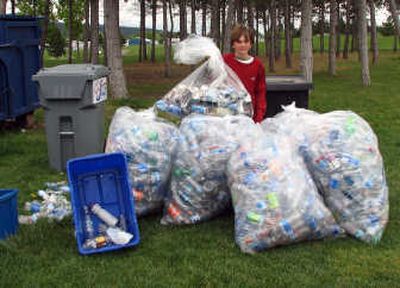Soccer player brings class project to field

Early Saturday morning, a time normally reserved for cartoons and cold cereal, 11-year-old Kienan Scott goes to the Plantes Ferry soccer complex in the Spokane Valley.
But Scott, who enjoys playing center midfield and left midfield, also is getting his kicks in another way – by keeping his recycling program in motion.
He puts out 20 to 30 bins in the morning, plays at least one game during the day, and returns at night to collect the recyclable materials. On tournament weekends it’s a similar drill – except he might make two visits a day to the park because of the volume of recycling left by players and spectators.
While Scott gets help from his bother, 10-year-old Rylan, his parents and sometimes a fellow soccer player, the recycling program was his design – the fruit of a school assignment.
Last winter Scott and classmate Erich Jaegar designed the Plantes Ferry recycling program for a school project called “The Consequences of Human Choice.” The project, assigned to all West Valley City School students, got students to think about and create solutions to local problems.
Scott came up with an immediate solution. He had noticed how quickly recyclable plastic water bottles accumulated in the trash at the park every weekend. His idea quickly took form.
“His (project) was fantastic,” says City School teacher Scott Adams. “Because my sons play at Plantes Ferry, I got to see it firsthand when he implemented it.”
“Kienan’s report was shared with the board and received very well,” says Scott Smits, president of the Spokane Valley Junior Soccer Association, which runs the soccer complex at Plantes Ferry. “It was very professional, considering his age.”
With the approval of the soccer club and the encouragement and help of his parents, Scott started the recycling program during the spring soccer season. He earned a sage-worthy grade, the highest possible at City School and earned only by students who implemented their projects.
“The first weekend in the spring, we got one and a half of the little blue containers,” said Scott’s mother, Kelly, of the recycling gathered.
The biggest surprise, said Scott, was how many people continued to put plastic bottles in the garbage, even though the recycling bins were next to trash cans. But the idea soon caught on.
“By the fourth time we did it, we got six 55-gallon bags of plastic,” said Kelly Scott.
Now during tournaments, they recycle about 20 cubic yards of plastic bottles, said Kelly Scott. The typical dumpster holds only six yards. To handle that much recycling, the Scotts rent a 30-yard container for tournaments and pay the $75 to haul it off.
During the regular season, they use a six-yard container and dump it about every other weekend, which costs about $35 per month. They hope to eventually get corporate sponsors to help with recycling costs.
The soccer association spends approximately $150,000 each year maintaining the fields, says Smits, adding that the organization doesn’t have the people to handle the recycling.
“The biggest key is volunteers. We are a nonprofit, volunteer-based organization. We task the same people over and over and over again,” said Smits. “We have to prioritize where we use our volunteers, maintaining game and activities. It takes a third party with a passion for recycling.”
That passionate third party is Kienan Scott and his family, but they could use some help collecting the recycling, especially on weekends they have out-of-town games.
“The recycling is well-received by people who are green-minded,” said Smits. “But they fail to realize the amount of man-hours it takes to actually do.”
It takes 45 minutes to an hour to collect the recycling each day, said Kienan. While it isn’t a huge time commitment, it is ongoing, with soccer running through fall and spring. During the regular season, Smits estimates they have about 75 games per weekend at Plantes Ferry with an estimated 5,000 people using the park each day – although some players and spectators come through more than once to attend multiple games.
Smits said the park is now diverting about 20 percent of its waste stream into recycling. Since Smits is a sales engineer for Western Systems and Fabrications, part of the waste management industry, he shares those results and Kienan’s school report with other communities to show “what can be done by green-minded people, regardless of their age.”
“I learned that it is good to recycle and help the community, and it saves a lot of energy,” said Kienan. “They take the plastic bottles and melt them down and make them into new plastic bottles, saving energy and resources.”
And that lesson learned makes his parents proud.
“I want to teach my kids a sense of community,” said Kelly Scott. “This is their world. They can make it better.”